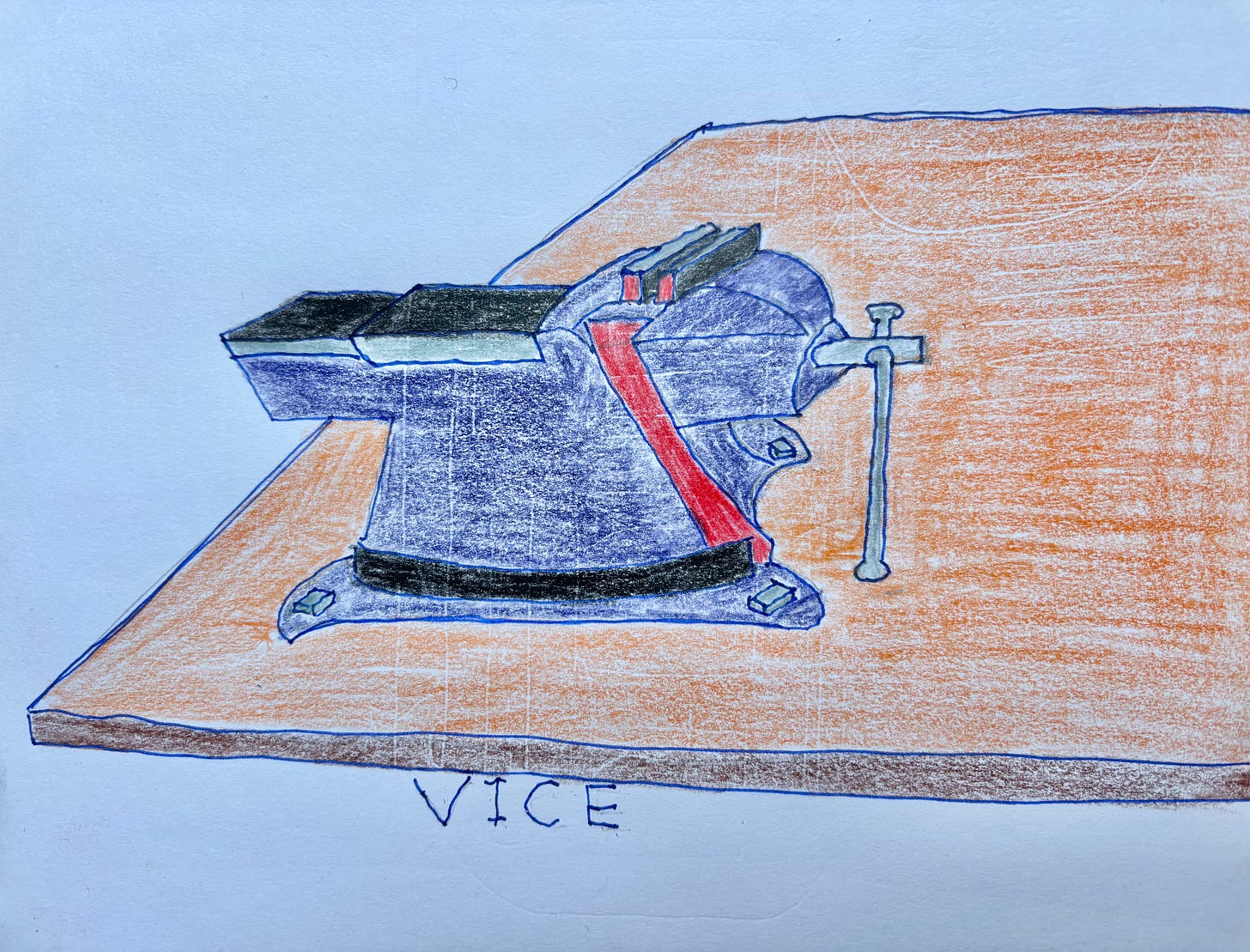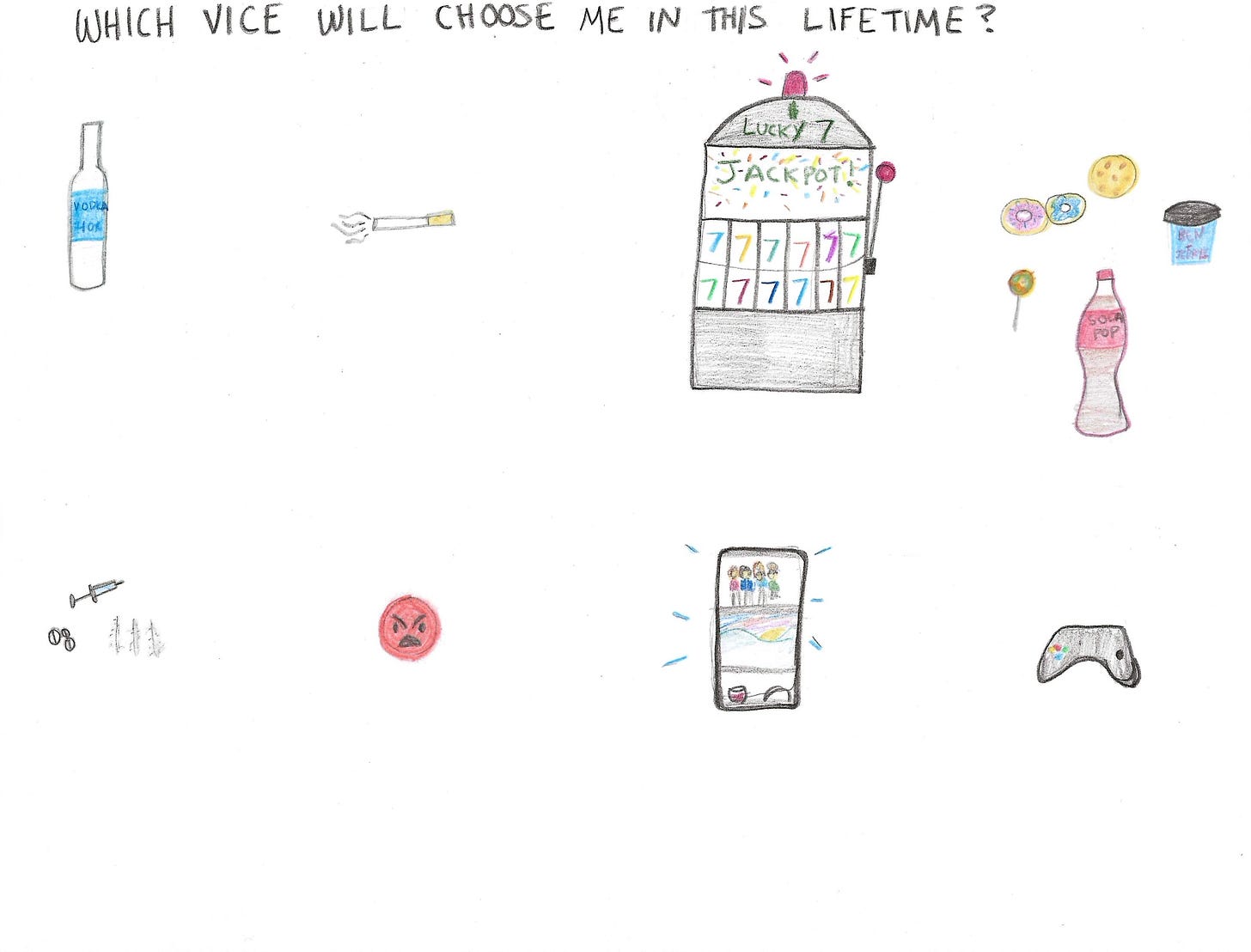Hi Zan, Hi Pa
Volume #37
March 25th, 2025
HI, PA: Let’s talk about vices. Do you have any?
HI, ZAN: Yes! I have a good one down cellar in my workshop…..
Pa (continued): Oh, that’s a vise, sorry. When I was a kid in Revere we called it a ‘vice’. As in, “Let me stick this piece of metal in the vice and see if I can straighten it out.” Vase was ‘‘vace,’ as in,”Put those flowers you bought for Ma in the vace.”
ZAN: You passed that one along—I say “vace” instead of vase too.
PA: Not the worst thing I passed on to you. Let me reconsider the question. Do I have any vices? A vice is wicked or immoral behavior. Yes, I have many. Why do you ask? Do you worry that you’ve inherited some?
ZAN: My only wicked behavior is that I’m a wicked good person!
PA: That you are. Said like a Bostonian, too. You weren’t born there, you inherited it through your paternal side.
ZAN: Kidding—I ask because Lent started recently and I know you usually give something up as a practice in self-discipline. What did you give up this year?
PA: I gave up sugar. So far, so good. I was about to buy some Beer Nuts yesterday when we were halfway through our four-mile walk. I had a sudden urge, and we were near a store that sells them. But your mother kindly reminded me that beer nuts have sugar, so I demurred.
As you know, I’m no longer a practicing Catholic (, though I went to Mass every week when we were in Italy this winter. I love spending time in the gorgeous churches there, and I’m so familiar with the rite that it brings me a kind of old comfort) but I do always observe Lent. Over the years I’ve given up all kinds of vices. Sweets, wine, TV. One year I did different things for a week each—vegan, vegetarian, no wine, no sugar, etc. One year—in this I failed—I tried to give up having negative thoughts about people.
ZAN: Ha—that’s quite the challenge!
PA: I failed miserably.
I do this, not to punish myself for my sins, but because I think it’s important to have some measure of control over your inner life, to maintain some balance there. I’ve always had a sweet tooth and, while it’s diminished, I still consume too much sugar. So, for six weeks, no sugar.
I wouldn’t classify sugar as a vice, though, would you? How would you define the word?
ZAN: There are more serious definitions of vice, but one is: “A habitual and usually trivial defect or shortcoming.” Considering that studies have shown that high sugar intake (especially in beverages) is associated with a number of adverse health effects, I guess you could say consuming a lot of sugar is a shortcoming, though certainly not an example of moral wickedness.
When I think of vices, I think of bad habits or weaknesses—something we choose to do against our better judgment.
PA: That’s interesting. When I hear the word I think of the more serious definitions. There used to be a popular TV show, “Miami Vice,” and the kinds of things they investigated were pretty evil. In the old days, most police departments used to have a ‘vice squad.’ They mostly chased prostitutes and drug dealers.
Whichever definition we talk about, do you think people ‘choose’ to do them, i.e., make a conscious choice, as you say, against their better judgment? Or do you think it’s truer to say they are ‘compelled’; they do these things reflexively, blindly, almost instinctively?
ZAN: I think a lot of it has to do with the reward centers in our brains, which were originally designed to guide us toward survival by making the things that kept us going (like eating or procreating) enjoyable. In that way, seeking out pleasure is very much instinctive. The problem, I think, is that there are lots of activities that reward us with dopamine but are morally wrong or not in our best interests.
One of my favorite examples is the concept of “revenge bedtime procrastination.” I remember doing this when I worked in restaurants—even though I was exhausted by the time I got home after my shift, I’d often stay up until 2 or 3 in the morning just to feel like I’d reclaimed a little bit of my day for myself. But then of course I’d wake up really late feeling exhausted, go right back to work, and repeat the cycle again rather than getting enough rest to actually feel good.
Maybe indulging in vices happens when we feel deprived of dopamine?
PA: I’ve never heard of that. I like the phrase: Revenge Bedtime Procrastination. But what an interesting—and sad—way to make up for feeling you’ve wasted part of your life.
I think a lot about the pleasure/pain balance in life. It’s connected to my Lenten practice, actually. You know I’m interested in the monastic life. Interested, not tempted. Monks and nuns purposely make their lives more difficult—celibacy, fasting, rising early. Do you think that’s just crazy and guilt-driven, or are they trying to see what happens when you deprive yourself of dopamine and don’t seek revenge?
Keep reading with a 7-day free trial
Subscribe to Hi Zan, Hi Pa to keep reading this post and get 7 days of free access to the full post archives.






